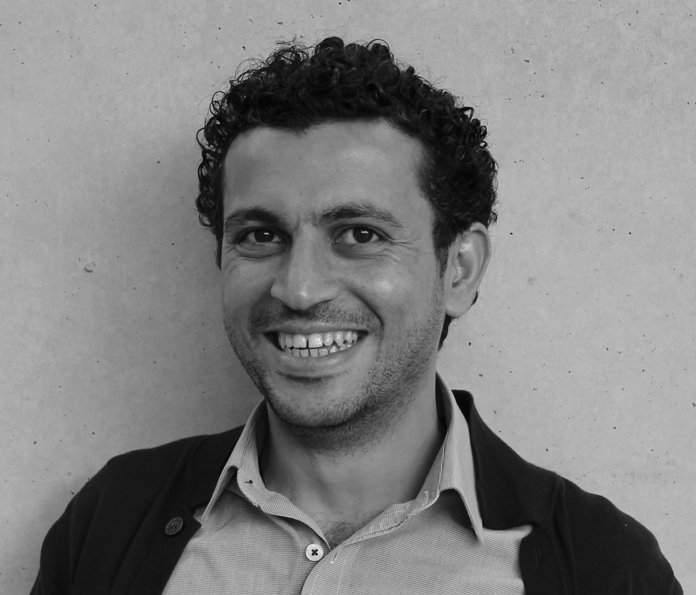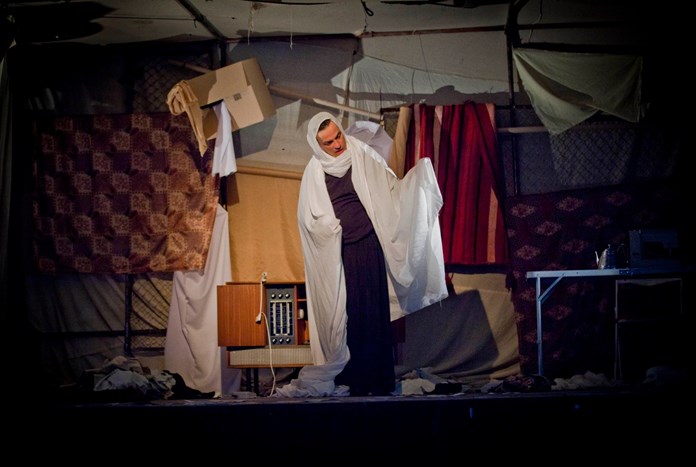"This year marks the seventieth anniversary of the Nakba. It is a sentence that a lot of people will read over the coming months and may choose not to delve too deeply into." Loosely based on a real-life character still living in Gaza, 'The Shroud Maker' is a dark new satire, telling one woman’s story of survival.
This year marks the seventieth anniversary of the Nakba. It is a sentence that a lot of people will read over the coming months and may choose not to delve too deeply into.
Having just got to grips with the Balfour Declaration, which had its own one-hundredth anniversary last year, some may find the whole thing rather confusing. It seems like when it comes to the Palestinian struggle, there is always one anniversary after another.
This is true and mainly due to the fact that the injustice continues under our nose, not so different from what it was a few decades ago. Perhaps it could
be worse, mainly because of the loss of hope. My young nephew in the besieged Gaza Strip, who is excellent at school with top marks that would get him to Oxbridge, would agree. In fact, it was because of him that despair has crept up to me, as I saw his enthusiasm for studying starting to dwindle. “What’s the point?” he said to me. “I will probably end up unemployed anyway.”

Keeping hope
Palestinian writer, director, playwright, curator and Amos Trustee, Ahmed Masoud.
Photograph: © Matthew Leake
I could not argue with him, I just had to do my uncle’s duty thing and tell him to be patient and that he should continue to study hard and that education can change his situation… blah, blah. Of course, all of this went in one of his ears and came out of the other, no doubt.
This year marks the seventieth anniversary of the Nakba. It is a sentence that a lot of people will read over the coming months and may chose not to delve too deeply into.
But I could not say any more, because I am not convinced myself that things will be better, that hope does still exist, lurking around some dark corner of my subconscious mind. How could it exist when I haven’t seen my parents for the last five years? When my parents still haven’t met my daughter? When my mother cries over the phone and tells me that she wishes she were in a real prison because she would’ve served her sentence by now, or at least would have visiting hours so she could see me. She broke my heart and I don’t think I will ever recover from it.
My pain is hard to explain, and is perhaps better bottled-up for another time; at least until it is over and we can start to take care of the side effects. Or maybe it is what I do — release my pain by creating characters on stage or in novels, so readers can understand me better. They can come to hear a story, just like any story, filled with tales of people in Palestine, their humanity, their humour, their dark side and their resilience.
This year, I am curating an exciting Palestinian Festival of Culture entitled @70: Celebration of Contemporary Palestinian Culture. It will take place at the Royal Academy of Dramatic Arts (RADA) between 14th-20th May 2018. And yes — as you guess, it is to mark the seventieth anniversary of the Nakba.
The week-long performances will include my play The Shroud Maker, Ahmed Najar’s and Al Zaytouna’s dabke dance production entitled Project 51, live music by renowned Palestinian singer Sana Moussa and film screenings curated by MARSM.
My pain is hard to explain, and is perhaps better bottled-up for another time; at least until it is over and we can start to take care of the side effects. Or maybe it is what I do — release my pain by creating characters on stage or in novels, so readers can understand me better.
The Shroud Maker will be the backbone of the festival and will play six nights throughout the week. This one-woman play tells the story of Hajja Souad, an 80-year old woman living in Gaza who has survived decades of wars, deportation, and oppression through making and selling shrouds for the dead, profiting from the continuous Israeli attacks. These Israeli attacks on Gaza prove highly lucrative
for Hajja Souad — until her past returns to haunt her, forcing her to make a momentous decision. Her deliberations take us on a lifetime’s journey, telling
a harrowing story of courage, love, escape, and disappointment.
Leaving her village of Aqqur near Jerusalem as a young girl, Hajja Souad enters the service of the British High Commissioner in the late 1940s and grows up as the adopted daughter to his wife, who teaches her English manners and elocution. But in the chaos of the British withdrawal, as the Union Jack is lowered from the port of Haifa, Hajja is left alone to her fate in the abandoned mansion.
This year, I am curating an exciting Palestinian Festival of Culture entitled @70: Celebration of Contemporary Palestinian Culture. It will take place at the Royal Academy of Dramatic Arts (RADA) between 14th-20th May 2018. And yes — as you guess, it is to mark the seventieth anniversary of the Nakba.
She is loosely based on a real-life character still living in Gaza. I wrote this as a dark satire telling Hajja Souad's story of survival. It's also a comedy, which delves deep into the intimate life of ordinary Palestinians, weaving a highly distinctive path through the modern history of Palestine. I wanted to base it on true stories told to me to create a vivid portrait of Palestinian life in Gaza underscored with gallows humour.
I hope that you will be able to come and see the play, hear my story and be witness to my pain. Perhaps this is the only thing that still gives me hope, knowing that people still care.
Links: @70: A Celebration of Contemporary Palestinian Culture | Ahmed Masoud | RADA

















